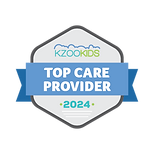

Articulation:
The modeling of sounds correctly during play activities and therapeutic participation helps stimulate skills for articulation development. The level of play is age-appropriate and related to the child’s specific needs. The SLP may show or facilitate the child how to make certain sounds, such as the “r” sound, and may demonstrate how to move the tongue to produce specific sounds.
Oral-Motor:
The SLP uses a variety of oral exercises — including facial massage and various tongue, lip, and jaw exercises — to strengthen the muscles of the mouth. The SLP also may work with different food textures and temperatures to increase a child’s oral awareness during eating and swallowing. This is also aided by intervention with an Occupational Therapist specialized in feeding and oral motor intervention programs.
Who Can Benefit?
-
Social emotional issues
-
Hearing impairments
-
Developmental delays
-
Chronic hoarseness
-
Birth defects – such as cleft lip or cleft palate
-
Autism
-
Motor planning problems
-
Respiratory problems (breathing disorders)
-
Weak oral muscles
-
Excessive drooling
-
Executive functioning challenges/memory struggles
-
Auditory Processing deficits
-
Feeding and swallowing disorders
-
Traumatic brain injury
Speech Therapy

What is Speech Therapy?
A speech disorder refers to a problem with the actual production of sounds, whereas a language disorder refers to a difficulty understanding or putting words together to communicate ideas.
Speech therapy treatment focuses on speech, language, social skills, alternative communication needs, cognitive-communication, and oral/feeding/swallowing skills to address various types of communication problems (articulation; fluency; voice; receptive and expressive language disorders, and so on).
A speech-language pathologist (SLP), often informally known as a speech therapist, uses a variety of strategies, including:
Language: The SLP interacts with a child by playing, talking, and/or using pictures, books, objects, or events to stimulate language development. The therapist models correct pronunciation and the use of repetition exercises to build speech and language skills.







